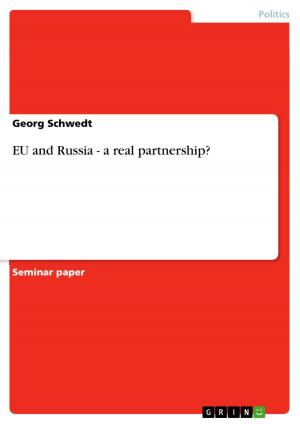User generated content - complement or threat to the print media industry?
complement or threat to the print media industry?
Business & Finance, Marketing & Sales| Author: | Ina Fuchshuber | ISBN: | 9783638870221 |
| Publisher: | GRIN Publishing | Publication: | December 4, 2007 |
| Imprint: | GRIN Publishing | Language: | English |
| Author: | Ina Fuchshuber |
| ISBN: | 9783638870221 |
| Publisher: | GRIN Publishing |
| Publication: | December 4, 2007 |
| Imprint: | GRIN Publishing |
| Language: | English |
Seminar paper from the year 2007 in the subject Business economics - Marketing, Corporate Communication, CRM, Market Research, Social Media, grade: 1,7, LMU Munich (Institut für Information Organisation und Management), course: 'Beyond Web 2.0', 37 entries in the bibliography, language: English, abstract: User generated content on the web is a phenomenon which has occurred only in the last couple of years. Internet users generate their own content and distribute it through weblogs, podcasts and wikis. They are now gaining more and more power and reach using new web 2.0 technologies to promote themselves through (social) networking and in online communities. Obviously traditional print media are facing a new competitor in the media market: the user. This thesis therefore asks the questions arising in the context how traditional print media and user generated content (UGC) interact: Can UGC be a competitor to the traditional media? The question is not if UGC will replace traditional media in near future but how the concepts of UGC could possibly compete or complement traditional media concepts. Have media usage habits already changed in the face of UGC? Right now it seems they have staid quite stable despite UGC. Nonetheless it is all the more important to look at the signs of change as this phenomenon is still in its initial stage. Should traditional media players therefore implement UGC? UGC seems likely to improve and transfer a brand image. It may give the traditional media players a new point of view of their target groups, attract new target groups and generate revenue through advertisement or by cutting costs. All these questions will be considered in this thesis, using the relevant data and research to give a good overview over the developments in the print media industry facing UGC, also giving examples of the German print media market.
Seminar paper from the year 2007 in the subject Business economics - Marketing, Corporate Communication, CRM, Market Research, Social Media, grade: 1,7, LMU Munich (Institut für Information Organisation und Management), course: 'Beyond Web 2.0', 37 entries in the bibliography, language: English, abstract: User generated content on the web is a phenomenon which has occurred only in the last couple of years. Internet users generate their own content and distribute it through weblogs, podcasts and wikis. They are now gaining more and more power and reach using new web 2.0 technologies to promote themselves through (social) networking and in online communities. Obviously traditional print media are facing a new competitor in the media market: the user. This thesis therefore asks the questions arising in the context how traditional print media and user generated content (UGC) interact: Can UGC be a competitor to the traditional media? The question is not if UGC will replace traditional media in near future but how the concepts of UGC could possibly compete or complement traditional media concepts. Have media usage habits already changed in the face of UGC? Right now it seems they have staid quite stable despite UGC. Nonetheless it is all the more important to look at the signs of change as this phenomenon is still in its initial stage. Should traditional media players therefore implement UGC? UGC seems likely to improve and transfer a brand image. It may give the traditional media players a new point of view of their target groups, attract new target groups and generate revenue through advertisement or by cutting costs. All these questions will be considered in this thesis, using the relevant data and research to give a good overview over the developments in the print media industry facing UGC, also giving examples of the German print media market.















